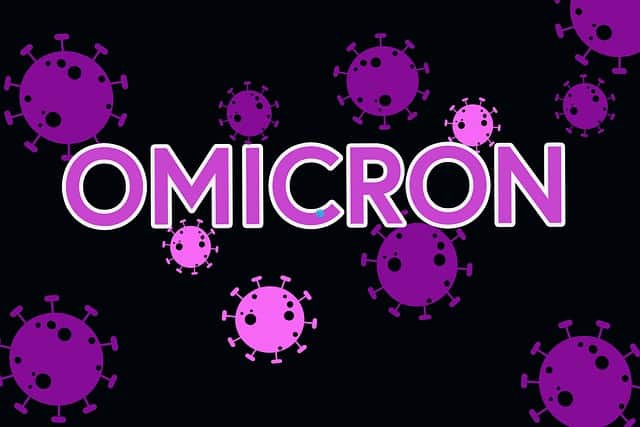Things To Know About The New Virus Omicron
On November 26 2021, the World Health Organization (WHO) named a newly discovered coronavirus variant “Omicron” and classified it as a “variant of concern”. This is a variant that has a very high number of mutations, easily enters the human body and is even more likely to make people who have recovered from Covid-19 re-infected with this variant than other variants. Here are the most basic things to know about the new virus Omicron.
See Also :
- 12 Ways To Manage Depression Without Medication
- 7 Habits That Drain Your Energy
- 8 Foods That Increase the Risks of Heart Attacks
- 7 Healthy Tips for Teenagers
- What is Granola? Is Granola Healthy?
- Red clover and its medicinal properties
Things To Know About The New Virus Omicron
Omicron has more than 30 mutant genes in the protein-coding gene, of which 10 are located in the “receptor-binding region”, making it more likely to successfully attach to human cells. In addition, several mutations of this variant have been detected in previous variants, which are associated with higher transmissibility and better evasion of the body’s immune and defense mechanisms
Why is this variant so disturbing?
The Omicron variant is considered worrisome because it has about 30 mutations on the S protein, nearly double the number of mutations seen on the Delta variant’s S protein. You should know that this protein facilitates the transmission of viruses to the cells of the body.
If a person’s antibodies from previous infections or vaccinations fail to recognize this new variant of the virus, it can successfully infect or re-infect people who were immune to the previous variants.
If so, it could have an impact on the person-to-person transmission of the virus, and also affect the severity of the illness it causes.
Is Omicron easier to transmit than other variants?
It’s still unclear, but preliminary data from South Africa seems to suggest it. According to currently available information, the variant reproduction rate (the average number of people from an infected person) is estimated to be 1.93 in Gauteng, while it is 1.47 for the whole of South Africa.
Symptoms of the Omicron Variant
A number of studies have revealed that the symptoms of the Omicron variant of COVID-19 are not much different from the symptoms of COVID-19 in general. However, further research on the Omicron variant COVID-19 still needs to be done to confirm this.
There are several symptoms of the Omicron variant of COVID-19 that are important for you to recognize, including:
Fever
Cough
Have a cold
Body feels tired
Headache
Sore throat
Muscle ache
Digestive disorders, such as nausea, vomiting, and diarrhea
The Omicron variant of COVID-19 is also at risk of causing other typical COVID-19 symptoms, such as impaired sense of smell (anosmia) or taste (ageusia). In certain cases, the Omicron variant of COVID-19 can cause more severe symptoms, such as shortness of breath.
However, these symptoms are more likely to occur in high-risk groups, such as the elderly, people who have not received the COVID-19 vaccine, or people with comorbid illnesses.
Are current vaccines effective?
This is a big question. While scientists are concerned about how many mutations this variant has undergone, it will not be completely free of antibodies developed by vaccination or other infection. However, the vaccine’s ability to protect may be reduced.
What about antivirals?
Oral drugs designed by Merck and Pfizer, which are currently being approved by national public health agencies, will also be effective against the Omicron variant. They do not target the S protein, instead, they prevent the virus from replicating.
What are International Health Authorities doing?
The World Health Organization, which rates this variant as worrisome, has set up a panel of experts to analyze the situation. Teams are testing the effectiveness of the current vaccines against the new variant.
According to WHO, the emergence of this new variant is a reminder of the importance of providing vaccines to poor countries. WHO has warned that the more the circulation of the virus, the more chance it has to grow and the more mutations we will see.
Preventive steps you can take to avoid the Omicron
The following are preventive steps you can take to avoid the Omicron variant of COVID-19:
Getting the COVID-19 vaccine
Getting a full dose of COVID-19 vaccine is one of the important steps that can be taken as an effort to prevent COVID-19, including the Omicron variant of COVID-19.
Several studies have stated that administering the COVID-19 vaccine can provide protection against infection with the Omicron variant of the Corona virus and reduce the risk of a person developing severe COVID-19 symptoms due to this variant.
In addition to full-dose vaccines, COVID-19 booster vaccines can also be given to maximize the protective effect against the Corona virus.
However, this additional vaccine is more recommended to be given to high-risk groups, such as health workers, the elderly, people with comorbid diseases, or people with immunodeficiency.
Maintaining a healthy lifestyle
Unhealthy lifestyles, such as lack of sleep, infrequent exercise, smoking, frequent stress, and excessive alcohol consumption, are known to have an impact on weakening the body’s immunity. When your immune system weakens, you will be more susceptible to diseases, including COVID-19.
Therefore, in order for the body’s immunity to remain strong against bacterial and viral infections, you need to live a healthy lifestyle.
Eat nutritious food
Several studies suggest that consuming nutritious foods that are rich in protein, vitamins, minerals, and antioxidants can strengthen the body’s immune system so that it can reduce your risk of contracting any type of COVID-19, including Omicron, and prevent severe COVID-19 symptoms.
To keep the immune system strong, you need to eat nutritious foods, such as eggs, milk, fish, nuts, seeds, and various types of vegetables, such as broccoli, kale, and spinach, as well as fruits, including guava. seeds, kiwi, and oranges.
Consuming fruits high in vitamin C
As mentioned above, fruits are a good choice of food to strengthen the immune system. This is because some types of fruit contain lots of vitamin C. Well, one type of fruit that is rich in vitamin C is guava.
Guava is one type of fruit that is the best source of vitamin C. This is because in 1 medium-sized guava or the equivalent of 55 grams, it contains about 125 grams of vitamin C.
Not only vitamin C, guava is also high in vitamin A, minerals, and antioxidants which are good for keeping the immune system strong against infections, including Corona virus infections.
The benefits of guava to maintain the immune system can be obtained by consuming the fruit directly or in the form of original guava fruit juice which is packaged hygienically, making it more practical and easy to consume.
Implement health protocols
Given that the Omicron variant is more contagious than the Delta variant, it is important for you to always follow health protocols to reduce the risk of contracting Corona virus infection.
In accordance with the statement from World Health Organisation, the health protocols you need to do are – wearing masks, washing hands, maintaining physical distance, staying away from crowds, and reducing mobility.
Beauty Tips – CLICK HERE
These were the By recognizing the symptoms of Omicron variants and how to deal with them, you are expected to be calmer and more alert in dealing with them. Don’t forget to always comply with health protocols to break the chain of spreading the Corona virus.
You can also consult a doctor if you still have questions about the symptoms of the Omicron variant of COVID-19.
Popular Posts :
- 12 Ways To Manage Depression Without Medication
- 7 Ways To Overcome Laziness To Exercise
- 7 Habits That Drain Your Energy
- 8 Foods That Increase the Risks of Heart Attacks
- 7 Healthy Tips for Teenagers
- What is Granola? Is Granola Healthy?
- Red clover and its medicinal properties
- 7 Home Remedies To Relieve Constipation Naturally
- 5 Easy Ways to Control Overeating Desire
- Heart Attack At A Young Age
- Spirulina – a natural way to strengthen immunity
- 10 Signs Your Body Is Lacking Minerals





